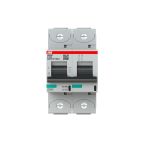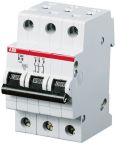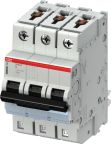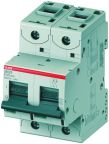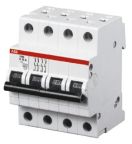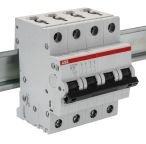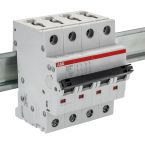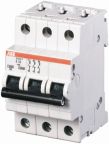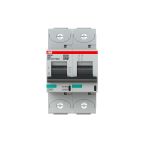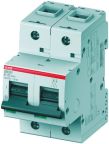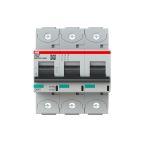MCBs
MCBs, or Miniature Circuit Breakers, are electrical devices designed to protect an electrical circuit from damage caused by overcurrent. They serve as a crucial component in the electrical distribution system of buildings, homes, and industrial facilities.
How Miniature Circuit Breaker Works
Miniature circuit breakers operate as automatic circuit interrupters, swiftly disconnecting the electrical circuit when they detect a current surge exceeding the circuit's rated capacity. This decisive action prevents overheating, averting potential damage to wiring, appliances, and other connected devices. By acting as a safety valve, MCBs safeguard electrical systems and mitigate the risk of electrical fires.
Different Types of Miniature Circuit Breakers
MCBs are available in various types, each calibrated to trip at specific overcurrent levels, catering to the unique demands of different electrical loads.
MCBs come in different types, including Type B, C, and D, each designed to trip at different levels of overcurrent. The choice of MCB type depends on the specific characteristics of the electrical load it is protecting.
Type B
Type B MCBs are general-purpose circuit breakers commonly used in domestic installations. They are designed to trip at current levels between 3 and 5 times the rated load current, providing protection against moderate overloads and short circuits.
Type C
Type C MCBs are tailored for applications with higher inrush currents, such as those encountered with motors and transformers. They trip at current levels between 5 and 10 times the full load current, ensuring effective protection for these specific loads.
Type D
Type D MCBs are engineered for circuits experiencing substantial inrush currents, typically associated with high-powered equipment. They trip at current levels between 10 and 20 times the full load current, providing robust protection for demanding industrial applications.
Industrial Applications of MCB Circuit Breakers
MCBs play a vital role in electrical safety by preventing electrical fires and protecting equipment from damage caused by excessive current. They are an integral part of modern electrical installations, contributing to the overall reliability and safety of electrical systems.
- Manufacturing and Production: In factories and production facilities, MCBs protect machinery, control panels, and other electrical equipment from damage caused by excessive current flow.
- Power Generation and Distribution: MCBs are integral components of power plants and substations, ensuring the safe and reliable distribution of electricity.
- Construction: On construction sites, MCBs safeguard temporary power supplies and protect workers from electrical hazards.
- Mining: In the demanding environment of mining operations, MCBs provide essential protection for electrical equipment and personnel.
- Oil and Gas: In the oil and gas industry, MCBs ensure the safe operation of electrical systems in hazardous environments.
MCB Circuit Breaker Installation
MCBs are typically installed in distribution boards or consumer units, serving as the first line of defence against overcurrent. They are often used in conjunction with residual current devices (RCDs) for enhanced electrical safety. Proper installation by a qualified electrician is crucial to ensure optimal performance and safety.
Tripping Mechanism of an MCB
MCBs employ both thermal and magnetic tripping mechanisms to detect and respond to overcurrent conditions. The thermal element reacts to prolonged overloads, while the magnetic element trips instantaneously in response to short circuits. This dual-action mechanism ensures comprehensive protection against a wide range of electrical faults.
How to Reset a Mini Circuit Breaker
After tripping due to an overcurrent event, MCBs can usually be reset manually by simply switching the lever back to the "on" position. However, it is imperative to investigate and address the root cause of the overcurrent before resetting, preventing potential hazards and ensuring the safety of the electrical system.
How to Choose the Right Mini Breakers
Selecting the appropriate mini breakers involves considering several factors:
- Rated Current: Choose an MCB with a rated current that matches the maximum current expected to flow through the circuit.
- Tripping Characteristic: Select the appropriate type (B, C, or D) based on the characteristics of the electrical load.
- Number of Poles: Determine the number of poles required based on the type of circuit (single-phase or three-phase).
- Breaking Capacity: Ensure the MCB has a sufficient breaking capacity to interrupt the maximum fault current that could occur in the circuit.
- Brand and Quality: Choose MCBs from reputable manufacturers to ensure reliability and performance.
How to Maintain MCB Electrical Breakers
Regular maintenance is crucial to ensure the longevity and optimal performance of your MCB electrical breakers. Here are some essential tips:
- Visual Inspection: Periodically inspect MCBs for signs of damage, wear, or overheating.
- Cleaning: Keep MCBs clean and free from dust and debris.
- Testing: Conduct regular testing to ensure MCBs are tripping at their designated current levels.
- Replacement: If an MCB shows signs of damage or fails to trip during testing, replace it promptly.
Trusted MCB Manufacturer, Supplier & Distributor in Australia
RS is a leading distributor of MCBs and offer a comprehensive selection of high-quality Miniature Circuit Breakers from industry-leading brands including ABB, Siemens, Schneider Electric and Lovato. Our expert team is available to provide technical support and guidance, assisting you in finding the ideal MCB solutions for your specific needs.
Buy Miniature Circuit Breakers from RS
Ordering miniature circuit breakers from RS is quick and convenient. Browse our extensive online catalogue, select the products you need, and place your order. We offer fast and reliable delivery across Australia. For delivery details, please refer to our Delivery Page.
Popular Searches
Related links
- Complete Guide to MCBs: Type A C D Circuit Breakers
- Schneider Electric Acti 9 Spacer for use with C120/C60 Miniature Circuit Breakers, Clario/Librio/ProDis Circuit
- ABB Busbar for use with Miniature Circuit Breakers
- ABB Cable for use with Miniature Circuit Breakers
- Siemens Sentron Remote Controlled Mechanism for use with Miniature Circuit Breakers
- Siemens Sentron 5SY Mounting Adapter for use with Miniature Circuit Breakers
- Siemens Sentron Mounting Adapter for use with Miniature Circuit Breakers
- Siemens Sentron Handle Locking Device for use with 5SP 5TE8 Miniature Circuit Breakers, Padlock with Maximum 3 mm
